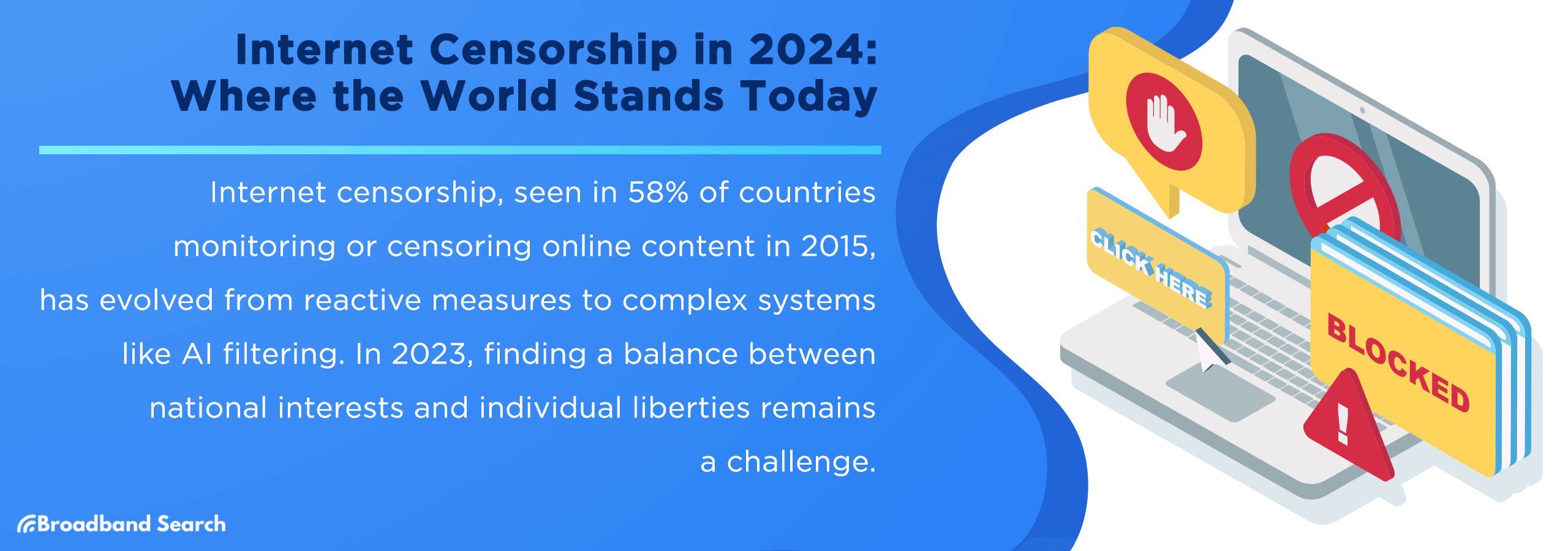Internet censorship, epitomized by the famous quote "Information is the currency of democracy" by Thomas Jefferson, is the deliberate control or suppression of information and ideas on the internet. The statistics are telling – in 2015, Freedom House reported that 58% of internet users lived in countries where authorities censored or monitored online content, emphasizing the scale of this phenomenon.
From the early days of the internet, where censorship was often reactive and focused on illegal activities, it has morphed into a complex web of proactive measures. In the past year, we witness AI-powered content filtering, encryption battles, and the constant struggle to find the right balance between safeguarding national interests and preserving individual liberties. Understanding this multifaceted landscape is crucial in grasping the state of internet censorship today.
The Reasons Behind Censorship
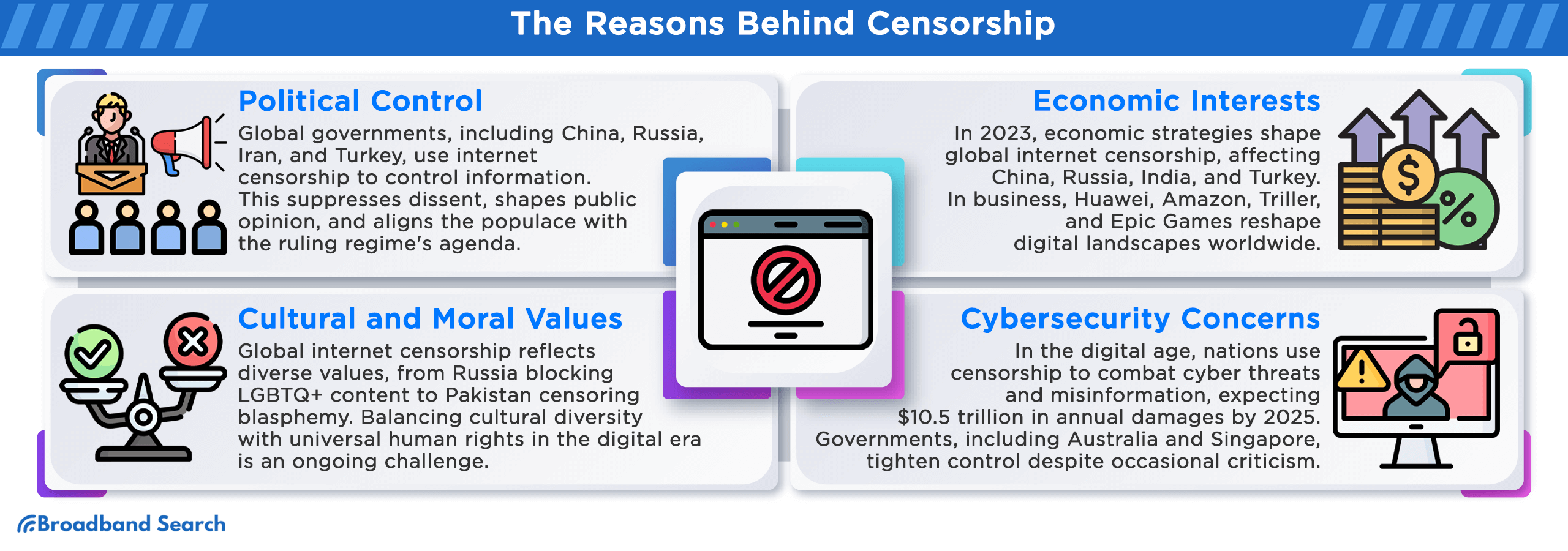
Political Control
Governments worldwide have long recognized the potency of the internet as a platform for free expression and dissent. As a result, many have instituted varying degrees of censorship, often under the guise of maintaining public order or national security.
- China: Renowned for its Great Firewall, China actively suppresses criticism against the Communist Party. A 2023 study by the Citizen Lab revealed that mentions of controversial events or figures are quickly scrubbed from Chinese cyberspace, ensuring a sanitized online environment.
- Russia: With laws requiring domestic storage of citizens' data and swift content removal, Russia curbs opposition voices. Recent legislation further tightens control, targeting independent media and online influencers critical of Kremlin policies.
- Iran: Internet disruptions and shutdowns are common, especially during protests or political unrest. The government's National Information Network, designed to give Iranians a heavily controlled web experience, remains at the forefront of this endeavor.
- Turkey: Post-coup attempts in 2016, Turkey has been aggressive in silencing opposition online. The Freedom on the Net 2023 report indicates a spike in arrests of individuals for their online activities, particularly those criticizing President Erdoğan or government policies.
More than just silencing, censorship allows regimes to shape public opinion. By controlling the flow of information, governments can amplify favorable narratives while drowning out dissent. This tactic isn't about merely suppressing the truth; it's about rewriting it, ensuring the populace remains aligned with the ruling regime's agenda.
Cultural and Moral Values
Beyond political control, cultural and moral values play a significant role in shaping internet censorship. The notion of what's "appropriate" varies across cultures, prompting countries to enact specific bans:
- LGBTQ+ Content in Russia: A 2022 Amnesty International report highlighted Russia's stringent laws against "gay propaganda," resulting in a vast censorship of LGBTQ+ content online, seen as "corrupting the traditional family unit."
- Blasphemy in Pakistan: Pakistan's Telecommunication Authority frequently blocks content considered blasphemous under religious laws. According to a 2023 Digital Rights Foundation report, hundreds of URLs get blocked annually for religious reasons.
- Historical Revisionism in Japan: Content addressing WWII, especially topics like comfort women, faces censorship due to its sensitive nature, as observed in a 2023 study by the Asia Digital Rights Watch.
- Female Dress Codes in Saudi Arabia: Any representation of women not adhering to strict dress codes faces online censorship. As per a 2017 report, this includes international media or advertisements.
- Political Satire in Thailand: The country's lèse-majesté laws prohibit any form of disrespect towards the monarchy. The Electronic Transactions Development Agency, in its 2021 report, cites numerous cases of satirical content removal.
The ongoing debate between cultural relativism and universal human rights poses profound questions about the nature of the internet as a global space. As we move forward, the challenge lies in finding common ground that respects diverse cultural perspectives while upholding fundamental principles of freedom and human rights in the digital age.
Economic Interests
The intertwining of economic strategies and internet censorship has sharpened in the past year. Protectionism in the digital realm is more evident:
- China: China's "Great Firewall" protects native companies like Tencent and Alibaba, while services like Google and Facebook remain inaccessible. Studies indicate that by 2023, Alibaba’s cloud service has grown by 25%, partially due to this protection.
- Russia: Favoring platforms like Yandex and VKontakte, Russia's restrictions on Western tech giants have bolstered domestic growth, with VKontakte's user base surging to 500 million.
- India: Favoring Jio Platforms and other local entities, India has occasionally banned foreign apps, citing both security and economic concerns.
- Turkey: Prioritizing local digital ventures, international platforms like YouTube faced intermittent bans, redirecting traffic to native alternatives.
In the arena of business competitiveness:
- Huawei vs. Western Nations: Accusations of espionage led several countries to restrict Huawei, seemingly a mix of genuine concerns and business competition.
- Amazon's European Woes: Accused of favoring its own products on its marketplace, Amazon's actions led to regulatory scrutiny in the EU in 2021.
- ByteDance vs. Triller: In a high-profile feud, Triller accused ByteDance's TikTok of copyright breaches, seeking a ban in the US market.
- Epic Games vs. Apple: The feud shocked many when Epic Games challenged Apple's App Store monopoly, leading to global debates on platform monopolization.
These economic maneuvers have not only reshaped digital landscapes but also redefined how businesses and countries approach the internet's potential.
Cybersecurity Concerns
In an age of burgeoning digital dependency, cybersecurity has become a paramount concern, prompting nations to employ censorship as a countermeasure.
Misinformation, colloquially termed "fake news", has seen an unprecedented rise. A 2019 report from the Centre for International Governance Innovation disclosed that 86% of global internet users encountered misleading information monthly. This deluge of falsehoods, if unchecked, can sway elections, incite violence, or undermine public health responses.
Moreover, nations are clamping down on the digital realm to fortify against cyber threats. A study by Cybersecurity Ventures predicts cybercrime damages will escalate to $10.5 trillion annually by 2025. To preemptively counteract this, countries like Australia and Singapore have introduced stringent measures, censoring potential digital gateways for hackers.
In essence, while internet censorship often faces criticism, its adaptation as a cybersecurity tool demonstrates its multifaceted nature in the ongoing battle to protect and stabilize the digital domain.
Mechanisms of Internet Censorship
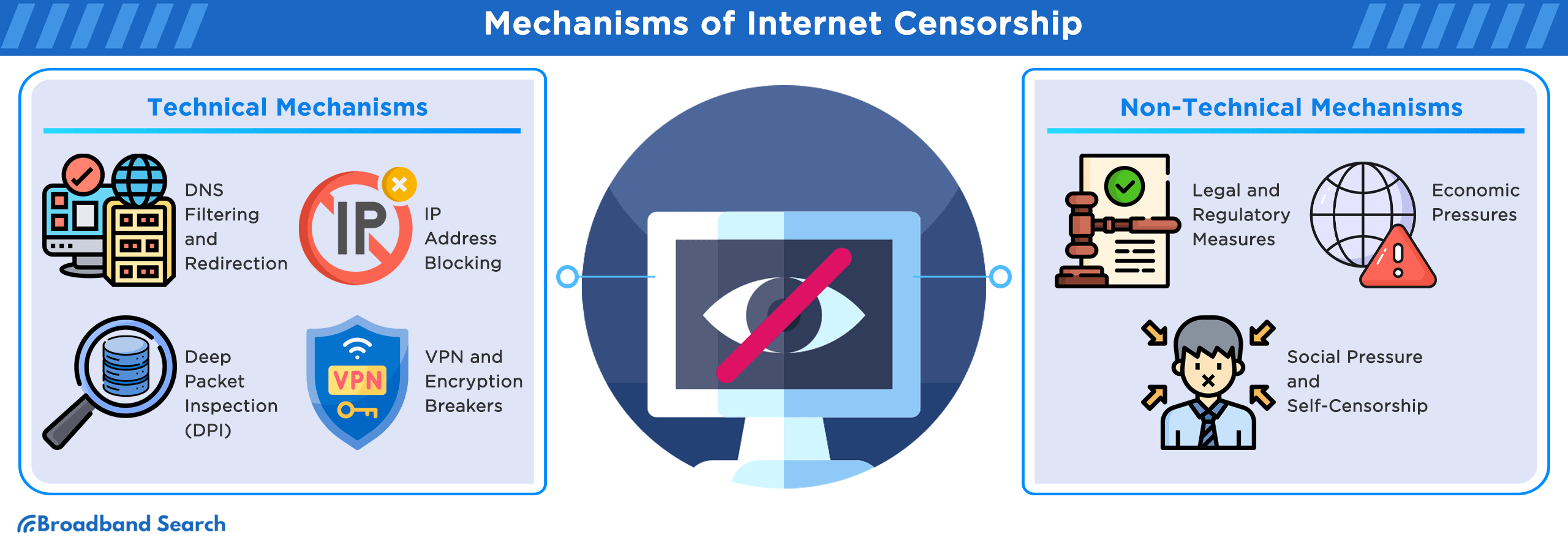
Technical Mechanisms
As the digital age progresses, so does the intricacy of internet censorship mechanisms. Beyond the discernible political or cultural motives, the underlying technical methods often remain opaque to the everyday user. Delving into these mechanisms reveals the multifaceted strategies governments employ to monitor, control, and often suppress the free flow of information:
DNS Filtering and Redirection
A primary tool in the censor's arsenal, this involves preventing the resolution of domain names. For instance, when Turkey temporarily blocked Wikipedia in the past, users found the domain unresolvable.
IP Address Blocking
More direct than DNS filtering, this method entails denying access to specific IP addresses. Russia's attempts to block Telegram by targeting millions of IP addresses is a testament to its widespread use.
Deep Packet Inspection (DPI)
A sophisticated technique, DPI involves analyzing internet traffic to filter content. Belarus recently faced criticism for employing DPI to silence dissent during political upheavals, as reported by NetBlocks.
VPN and Encryption Breakers
With the rise of VPNs as censorship evasion tools, countries have begun counteracting them. Iran, for example, has long been involved in efforts to undermine VPN encryption, an issue highlighted by Freedom House's 2023 report.
By understanding the technical nuances behind internet censorship, we gain a comprehensive view of the lengths to which regimes will go to maintain digital dominance in this information age.
Non-Technical Mechanisms
Beyond the realm of sophisticated software and digital tools, non-technical strategies are leveraged to suppress the digital discourse. Legal mandates, intimidation tactics, and social pressures converge, forging an environment where self-censorship thrives and dissenting voices tread lightly, altering the very ethos of digital freedom.
Legal and Regulatory Measures
Governments worldwide are leveraging legal frameworks to enforce digital silence. Laws mandating content removal or outright blocking have become ubiquitous. For instance, Australia's recent "Online Safety Act" exemplifies such measures, empowering authorities to pull down content deemed harmful, a revelation highlighted in the eSafety.
Economic Pressures
Economic coercion is a potent censorship weapon. Authorities target platforms' revenue lifelines, imposing fines or threatening economic resources. In the past year, Turkey intensified such tactics, leveraging hefty penalties against platforms non-compliant with its internet regulations, a strategy analyzed in detail in the Global Network Initiative’s latest report.
Social Pressure and Self-Censorship
An insidious form of control, societies instilled with fear often see individuals retreat from free expression, even sans direct state meddling. In Myanmar, the chilling aftermath of the 2021 coup fostered self-censorship, with citizens fearing repercussions, as reported by Human Rights Watch.
Global Overview of Internet Censorship in the Past Year
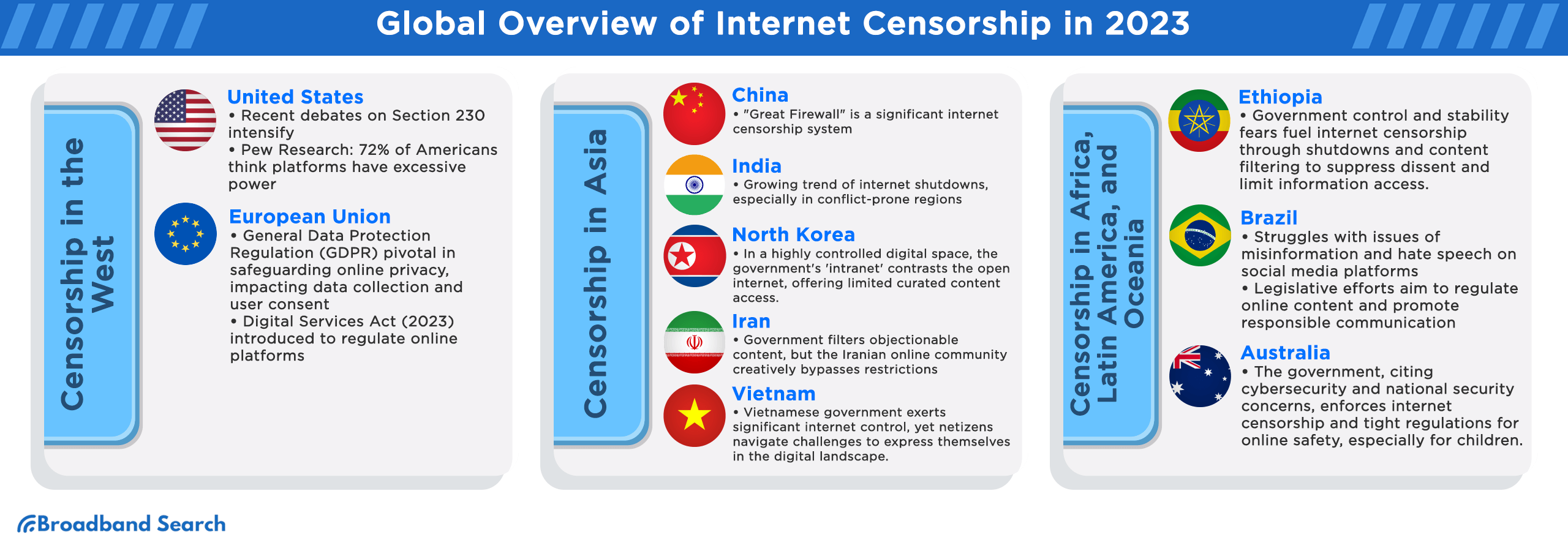
Censorship in the West
At present, internet censorship stands as a dynamic global issue, with distinct trends and developments in Western nations, including the United States and the European Union.
United States
In the US, recent debates surrounding Section 230 have intensified, focusing on the extent of legal protections for online platforms. Initially devised to shield platforms from being held liable for user-generated content, recent controversies have questioned whether these platforms should bear greater responsibility. A Pew Research research indicated that 72% of surveyed Americans believe platforms wield excessive power in shaping narratives.
Concurrently, a paradigm shift towards private platform censorship has been observed. Platforms have been increasingly exercising their discretion in "deplatforming" users, often for perceived policy breaches or divisive rhetoric. A 2023 Oxford Academic report highlights a staggering increase in high-profile deplatforming incidents compared to the previous year, sparking debates on digital free speech boundaries.
European Union
In the European Union, internet censorship dynamics are shaped by two key factors: data protection and the fight against harmful content. The General Data Protection Regulation (GDPR) continues to play a pivotal role in safeguarding online privacy and influencing the way content is handled. Its stringent rules on data collection and user consent impact how platforms operate and target users with content.
Simultaneously, the Digital Services Act, introduced in the past year, is pivotal in regulating online platforms. It places obligations on platforms to combat the spread of misinformation and hate speech. These measures aim to maintain a balance between freedom of expression and safeguarding user rights, yet they raise complex questions regarding content moderation practices and the responsibility of tech companies. The EU's approach to internet censorship underscores its commitment to protecting user data and promoting a safer online environment.
Censorship in Asia
The landscape of internet censorship in Asia is marked by a complex interplay of government regulations, technological advancements, and evolving strategies to control online information flow.
China
China's infamous "Great Firewall" remains a bedrock of internet censorship. This colossal system, consisting of legislative measures and advanced technological infrastructure, exerts a tight grip on the online world within China's borders. Beyond mere filtering of content, it involves rigorous monitoring of social media, foreign websites, and encrypted communication tools.
Recent developments indicate a deepening of control, with further restrictions imposed on content, platforms, and tools. This constant evolution in China's censorship landscape warrants a closer examination of its implications for freedom of expression and access to information.
India
India, on the other hand, grapples with a different facet of internet censorship. The country has witnessed a growing trend of internet shutdowns, particularly in conflict-prone regions, which profoundly affects communication and access to information.
Furthermore, India has enacted regulatory policies targeting social media and Over-The-Top (OTT) platforms, aiming to strike a balance between free expression and curbing misinformation. Examining these measures provides valuable insights into the evolving landscape of digital freedom in India.
Other Notable Countries
While much attention is focused on major players like the United States, China, and India, it's crucial to cast a spotlight on the less-publicized, but equally significant, state of internet censorship in other notable countries.
- North Korea: Operating under an iron grip of state control, North Korea remains one of the most isolated and tightly regulated digital environments globally. The government's "intranet" is a stark contrast to the open internet, providing limited access to curated content. The isolationist policies not only restrict external influences but also raise questions about the potential for change from within.
- Iran: With a complex interplay of politics and culture, Iran has its unique approach to internet censorship. The government employs filtering mechanisms to control access to content it deems objectionable, yet the Iranian online community often finds creative ways to bypass these restrictions. Understanding the dynamics of internet censorship in Iran unveils the resilience of online voices.
- Vietnam: In Vietnam, the government exerts considerable control over the internet, aiming to suppress dissent and maintain a favorable political environment. A complex web of regulations governs online behavior, requiring users to toe the official line. However, despite these challenges, Vietnamese netizens continue to find ways to express themselves and navigate this digital landscape.
Censorship in Africa, Latin America, and Oceania
While discussions on internet censorship often focus on prominent global players, it's equally imperative to explore the landscape in regions like Africa, Latin America, and Oceania. In this comprehensive overview, we shine a light on three diverse countries—Ethiopia, Brazil, and Australia—each offering unique perspectives on internet censorship.
Ethiopia
In Ethiopia, internet censorship has historically been driven by government control and political stability concerns. The state has employed tactics such as internet shutdowns and content filtering to stifle dissent and curtail access to information. Understanding Ethiopia's approach is pivotal in recognizing how governments in Africa navigate the digital age and the implications for civil liberties.
Brazil
In contrast, Brazil grapples with a different set of challenges, marked by a complex interplay of social, political, and legal factors. The country faces issues related to misinformation and hate speech on social media platforms. This has prompted legislative efforts to regulate online content and ensure responsible communication. Exploring Brazil's strategies unveils the delicate balance between free speech and the need for a safer online environment.
Australia
Meanwhile, Australia's approach to internet censorship is influenced by cybersecurity and national security concerns. The government has introduced measures to enhance online safety, particularly for children. This includes stringent regulations on social media platforms and content sharing. Delving into Australia's approach sheds light on the evolving landscape of digital safety and the potential implications for democratic processes.
The Impact on Global Communities
Internet censorship has become a defining feature of our digital age, impacting a wide spectrum of global communities in various ways. In this comprehensive overview, we explore the profound effects of internet censorship on activists and journalists, everyday users, as well as businesses and economies.
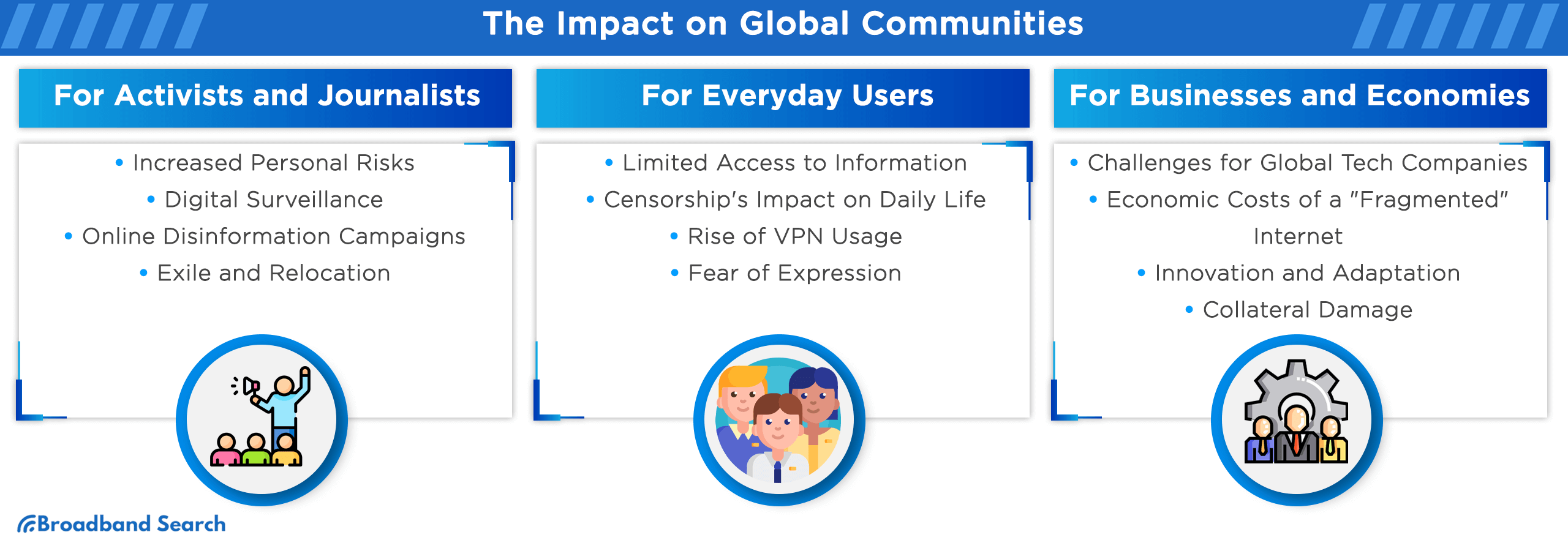
Activists and Journalists
In censorious regimes, the dangers confronting activists and journalists are multifaceted.
- Increased Personal Risks: In censored regimes, activists and journalists face heightened risks to their safety, including harassment, arrests, and even violence. The act of disseminating information or advocating for change can be perilous.
- Digital Surveillance: Government-sponsored digital surveillance has become increasingly sophisticated. Surveillance technologies, like spyware and tracking software, are deployed to monitor and target activists and journalists, undermining their ability to operate freely.
- Online Disinformation Campaigns: Activists and journalists often find themselves battling not only censorship but also online disinformation campaigns that seek to discredit their work or spread false narratives, further complicating their efforts.
- Exile and Relocation: Many activists and journalists are forced into exile or compelled to relocate due to the dangers they face in their home countries, disrupting their work and personal lives.
Everyday Users
For everyday users, the impact of internet censorship is felt in their daily lives.
- Limited Access to Information: Everyday users in censored regions often experience restricted access to information, hindering their ability to stay informed about current events, access educational resources, or engage in open discourse.
- Censorship's Impact on Daily Life: Censorship extends beyond politics; it affects entertainment, social interactions, and cultural exchanges. Users are often denied the full spectrum of content and experiences available to their global counterparts.
- Rise of VPN Usage: To bypass restrictions, many everyday users turn to Virtual Private Networks (VPNs) and other circumvention tools. This trend reflects the resilience of individuals seeking unrestricted access to information.
- Fear of Expression: Censorship breeds a climate of fear, leading some users to self-censor their online activities, inhibiting the free exchange of ideas and diverse perspectives.
Businesses and Economies
Global tech companies confront a host of challenges in the face of internet censorship.
- Challenges for Global Tech Companies: Global tech companies operating in countries with strict censorship laws face dilemmas regarding compliance with local regulations or maintaining their commitment to free expression. Striking the right balance is a complex challenge.
- Economic Costs of a "Fragmented" Internet: A fragmented internet, where content and services are restricted or blocked in various regions, poses economic costs. It disrupts the global flow of information and e-commerce, impacting trade and economic growth.
- Innovation and Adaptation: Some businesses innovate and adapt to the censorship landscape by developing tailored products or services that cater to censored markets, showcasing the resilience and adaptability of entrepreneurship in the digital age.
- Collateral Damage: Economic consequences extend beyond tech giants, affecting smaller businesses and startups trying to navigate the complexities of a censored internet.
The Future of Internet Censorship
Emerging Technologies and Implications
The landscape of internet censorship is rapidly evolving, driven by emerging technologies and their profound implications. Two pivotal factors shaping this landscape are the role of Artificial Intelligence (AI) and the emergence of quantum computing.
The Role of AI in Censorship
AI has emerged as a powerful tool in the hands of governments and tech companies, enabling predictive censoring and real-time content filtering. The advantages are twofold:
- Efficiency and Scale: AI can analyze vast amounts of content in real time, making it a formidable force for identifying and blocking prohibited material. For instance, AI-powered algorithms can swiftly detect and remove extremist content, minimizing its spread.
- Customization and Adaptation: AI's adaptive capabilities allow it to tailor censorship to individual users, ensuring that objectionable content is filtered out according to their specific preferences or location-based regulations.
As AI-driven censorship becomes more sophisticated, it raises critical questions about the balance between content moderation and free expression, particularly in democracies where this technology is deployed to combat harmful content while avoiding overt state control.
Quantum Computing and Encryption Battles
The advent of quantum computing heralds a new era in encryption, posing both opportunities and challenges in the realm of internet censorship. Quantum computers have the potential to crack existing encryption methods, rendering conventional security measures obsolete.
This development sparks a global race to develop quantum-resistant encryption, where governments, tech companies, and cybersecurity experts are collaborating to stay ahead of the curve. The battle between those seeking to break encryption and those striving to strengthen it has far-reaching implications for privacy, security, and the ability to circumvent censorship.
It is evident that the intersection of AI and quantum computing will shape the future of internet censorship in ways that extend beyond traditional methods. As these technologies continue to evolve, their impact on online freedom, security, and privacy will be at the forefront of the digital age's most critical debates, defining the way we navigate the virtual world in the years to come.
International Collaborations and Conflicts
The future of internet censorship hinges on international collaborations and conflicts. Organizations like the Electronic Frontier Foundation and Reporters Without Borders are at the forefront of defending digital freedoms worldwide. There's growing anticipation for a global digital human rights declaration, emphasizing the need to protect online liberties universally.
Yet, the threat of a "splinternet," where nations create isolated online ecosystems with differing rules and censorship practices, looms large. This fragmented internet landscape could hinder the free flow of information and challenge the very idea of a global, interconnected web.
Wrapping Up
The evolving landscape of internet censorship in 2024 highlights a perpetual struggle between control and freedom, where the delicate balance between these opposing forces shapes the digital world we inhabit. This tension manifests as states assert their authority, corporations navigate compliance and ethics, and citizens seek unfettered access to information and expression.
As we move forward, the battle lines in this global tug-of-war continue to shift. The aphorism "information wants to be free" resonates profoundly, illustrating the enduring human drive for unrestricted access to knowledge and communication. Yet, the quest for security and control persists, leading to innovations in censorship technologies and surveillance measures.
Looking ahead, the future of internet censorship remains uncertain, marked by potential trends, mounting challenges, and the enduring hope for a freer internet. It is a complex terrain where governments, businesses, and individuals must navigate the ever-evolving dynamics of the digital age, striving to strike a harmonious balance between control and the fundamental principles of freedom and openness.
FAQ
What are the main tools or platforms people use to bypass internet censorship?
Users employ Virtual Private Networks (VPNs), proxy servers, Tor, and DNS tunneling to circumvent internet censorship, enabling access to restricted content.
How do countries justify internet censorship to their citizens and the international community?
Governments often cite reasons like national security, public order, and protecting cultural values to justify censorship. Internationally, they may argue for sovereignty and non-interference.
Are there any global bodies or organizations that monitor and report on internet censorship worldwide?
Yes, organizations like Freedom House, Reporters Without Borders, and the OpenNet Initiative monitor and report on internet censorship trends, offering valuable insights.
How do tech companies respond when asked to comply with censorship requests by governments?
Tech companies often face ethical dilemmas, balancing between complying with local laws and maintaining global principles of free expression. Responses vary, from compliance to legal battles.
Has the global pandemic impacted internet censorship trends?
Yes, the pandemic has accelerated certain censorship trends, with governments using COVID-19 as a pretext to tighten control over information and suppress dissent.

